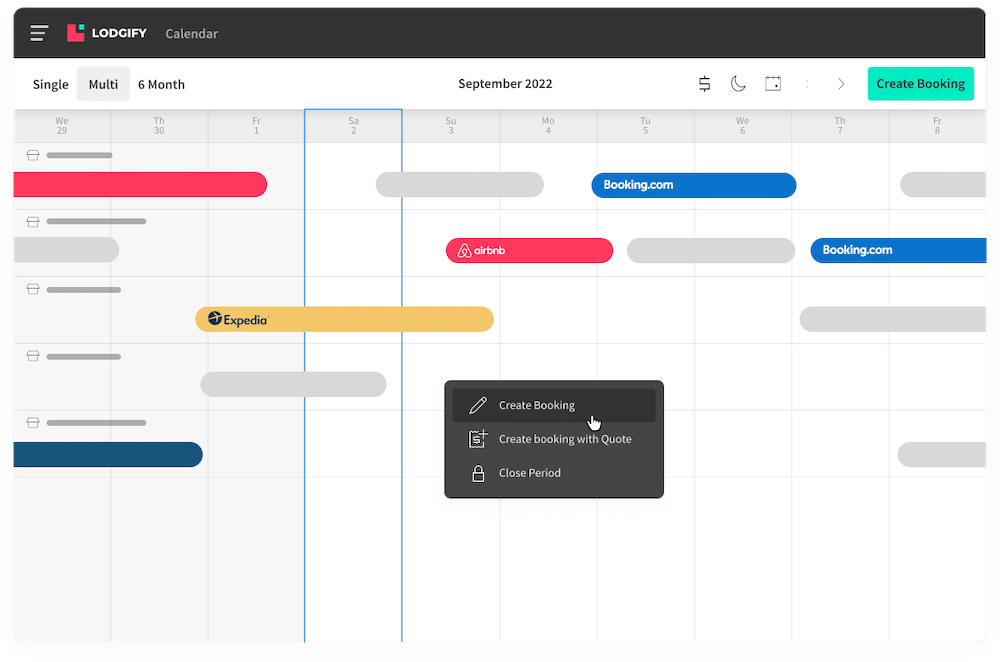When it comes to vacation rentals, renting to friends and family should be simple, right? After all, everyone knows and trusts each other.
Unfortunately, it’s not quite that straightforward.
Renting to personal guests can affect everything from your taxes to your bottom line. And if you don’t know how to navigate their requests, it could even end up affecting your relationships.
So, let’s review everything you should know before renting your vacation property to friends and family, from pros and cons to do’s and don’ts.
Don’t see the form to download the Rental Agreement Template? Click here.
Can you rent to family members and friends?
Of course! There’s no reason you can’t rent out your vacation rental to your friends and family. They’ll appreciate the chance to enjoy your property and will help fill your reservation calendar.
That being said, there’s a right and wrong way to handle renting your property to family members and friends. So, keep reading if you plan on making your loved ones regular guests.
Pros and cons of renting to family members and friends
Pros
First, let’s take a look at some of the benefits of opening your vacation rental doors to friends and family.
More bookings
Renting to relatives and friends can be a great way of getting more bookings, especially if you’re just starting out.
Your marketing efforts may take a while to pick up. In the meantime, it might give you peace of mind knowing that you have friends and family making reservations—even if they’re not paying full price.
More referrals
Your friends and family are sure to mention your vacation rental to people they know. And if they can personally attest to its qualities, their referrals will mean that much more.
Again, especially as you’re starting out, referrals like this can go a long way toward increasing your bookings.
Reinforces bonds

Your friends and family will certainly appreciate the chance to enjoy your vacation rental.
Maybe you’re letting them rent your property at a discounted rate. Or perhaps you host family reunions or holiday parties there.
Either way, your vacation rental will help create special memories and reinforce your bonds with your loved ones.
Cons
Unfortunately, renting property to family members and friends isn’t all sunshine and rainbows. Here are some cons to keep in mind.
Loss of income
Renting to friends and family doesn’t have to lose you money. Do it right, and you could even maximize your reservations (and income).
But the reality is that it’s all too easy to start managing these kinds of bookings poorly. You might give too high of a discount, or rent to friends and family on high-demand weekends when you could have gotten a much higher rate. That’s when you’ll start to see a dent in your revenue.
Affects your taxes
Many vacation rental owners are surprised to learn that renting property to family members and friends can significantly impact their taxes.
We’ll get into the specifics later on. For now, just know that renting your vacation rental to friends and family helps qualify it as a primary residence. (And so affects the taxes that you owe.)
It’s…complicated
And here’s the main thing: your family is your family.
It might feel amazing to provide a space to celebrate your grandma’s 80th birthday. But suddenly your distant cousin wants to host her bachelorette party there.
And then your uncle wants the place free of charge for Labor Day weekend.
As you can see, you’re traversing a slippery slope. And you’re going to wind up having some uncomfortable conversations if you don’t set some ground rules from the start.
Do’s and don’ts when renting to friends and family
So, how do you go about renting to your loved ones the right way? Let’s review some do’s and don’ts.
Do: sign an agreement

There’s no room for handshake deals when renting out vacation properties—even when it’s to your friends and family.
So, treat your friends and family like you would any other guest and ask them to sign a vacation rental agreement. After all, you expect them to treat your home the same way they’d treat any other property they were renting, right?
Make sure your agreement covers all the essentials, including:
- Prices and fees
- House rules
- Check-in and check-out instructions
- Capacity limits
- Cancellation policy
It might seem like overkill, but in the unlikely event of a dispute, you’ll be glad you have the agreement in place.
Don’t: let them stay for free
You may be tempted to occasionally comp friends’ and family’s stay. While your heart’s in the right place, resist the temptation!
Remember that your expenses do not magically disappear when you rent to friends and family. You still need to pay for your mortgage, utilities, and services such as cleaning and maintenance.
On top of that, you miss out on revenue when you let people stay for free. And the higher the demand during their stay, the more revenue you miss out on.
So, be sure to charge friends and family at least the minimum amount necessary to cover your expenses—if not a bit more. That way, they get a good deal without breaking your bank.
Hopefully your friends and family will understand without question. But if it helps, you can always show them your vacation rental’s current market rate and explain the situation to them. They’ll likely be more than happy to pay what’s necessary to cover your costs, and will still appreciate the discount.
Pro tip: To compensate for any revenue loss you incur by renting to relatives and friends at a discount, give them print marketing materials to use to refer paying guests.
Do: invest in insurance
You might assume that it’s okay to rent to personal guests before getting vacation rental insurance in place. Maybe you’re just starting out and wouldn’t rent to regular guests yet. But with friends and family, what could go wrong?
Don’t make this mistake. Accidents happen when you least expect them, even when you’ve taken precautions.
It could be something as minor as a broken vase. Or it could be something major, involving medical expenses. You just can’t risk it.
So, this “do” is simply to say that renting to friends and family absolutely warrants insurance, including liability, property, and contents coverage.
Don’t: forget about taxes

When you start renting to family members, tax deductions get more complicated. Essentially, renting to personal guests affects whether your property is seen as a residence or a vacation rental.
According to IRS Topic No. 415, the IRS will consider your property to be a residence if you use it for personal purposes for more than:
- 14 days per tax year, or
- 10% of the total days you rent it to others at a fair rental price
Here’s the kicker: according to the IRS, renting to family members and friends counts toward personal use. Specifically, personal use includes any time you:
- Use the property yourself
- Rent the property to family and friends
- Ask for less than a fair rental price
So if you rent out your property every day of the year and more than 36 of those days you’re renting to personal guests (or anyone paying less than fair market value), your vacation rental is actually a residence in the eyes of the IRS.
Why does this matter?
Whether your property qualifies as a residence or a rental affects both your taxable income and your potential deductions. For instance, if your property qualifies as a residence, you don’t have to report your rental income. But you also won’t be able to deduct expenses you incur when renting it out.
Keep in mind that we’re not tax experts. Consult with your tax advisor to better understand this rule and decide what makes the most sense for your vacation rental.
Do: ask for feedback
Consider your friends’ and family’s stay as a chance to improve your vacation rental.
Of course, you can always expect to get feedback from guests through reviews. But this is an opportunity to push for complete honesty and ask specific questions.
Is the water pressure strong enough? How’s the new mattress?
If they seem hesitant to offer criticism, remind them that pinpointing specific opportunities for improvement will help you create a better experience for paying guests.
And if they loved their stay and have no complaints, encourage them to leave reviews wherever they can! Especially if you’re just starting out, getting positive reviews will well make up for any discount you offered.
Don’t: let them stay during peak season
Chances are, your friends and family are going to want to book your vacation rental during popular travel times.
Why wouldn’t they want to visit your lakefront property over Fourth of July weekend? Or your mountain cabin during ski season?
Peak season will vary from one vacation rental to the next, depending on location, weather, and local events and activities. But one thing remains the same: you shouldn’t rent to friends and family during this time.
This is when demand for your vacation rental—and thus the rate you can charge—is the highest. These higher earnings are what enable you to get through the low season, and you simply can’t afford to miss out on them.
So, if friends or family reach out about booking during your peak season, simply explain the situation and suggest alternate dates. Better yet, create specific blackout dates during which friends and family can book. By focusing on your low season, you’ll ensure bookings when you might not otherwise have them.
Do: manage your calendar
Things can quickly spiral out of control if you don’t keep a close tab on your bookings.
What happens when a regular guest books on a date you promised to your parents? Or your siblings double-book during your blackout dates—one through Airbnb, and one through your website?
The only way to prevent mishaps like these is by keeping your reservation calendar up to date. And the best way to do that is with reservation calendar software.
For example, Lodgify’s Channel Manager syncs the calendars from all of your vacation rental listing sites to prevent double bookings. That means your reservations from Airbnb, Vrbo, your website, and anywhere else you’re listed are all in the same place.

On top of that, you can add blackout dates to prevent regular guests from booking during a time you’ve opened up to family.
Don’t: forget about marketing
You might get to the point where your friends and family—and their friends and family—make up a significant portion of your bookings. And if you’re charging regular rates, that’s not necessarily a bad thing.
However, don’t forget that there are a lot of strangers out there who might want to rent your property as well. If you rely on personal guests alone and fail to market your vacation rental, you’re missing out.
Of course, you can’t rent to everyone if you’re already at capacity. But at the same time, you can’t have too many interested guests. More demand simply means you can charge higher prices.
That’s all to say: don’t forget the bigger picture and fail to market your business. Only when you increase your listing’s visibility will you get a true sense of its success and potential.
Do: remember that you’re running a business
At the end of the day, the most important thing is to remember that your vacation rental is a business.
Keeping this in mind will help you to make smart decisions as you rent out your property—be it to friends, family, or complete strangers.
Renting to friends and family the right way
So, there you have it: renting your property to family members and friends can be done with minimal impact on your business. It can even be a win-win for you and your personal guests.
Like with anything, going into it with the right mindset is key. Get off on the right foot by downloading our vacation rental agreement template below.
Don’t see the form to download the Rental Agreement Template? Click here.


